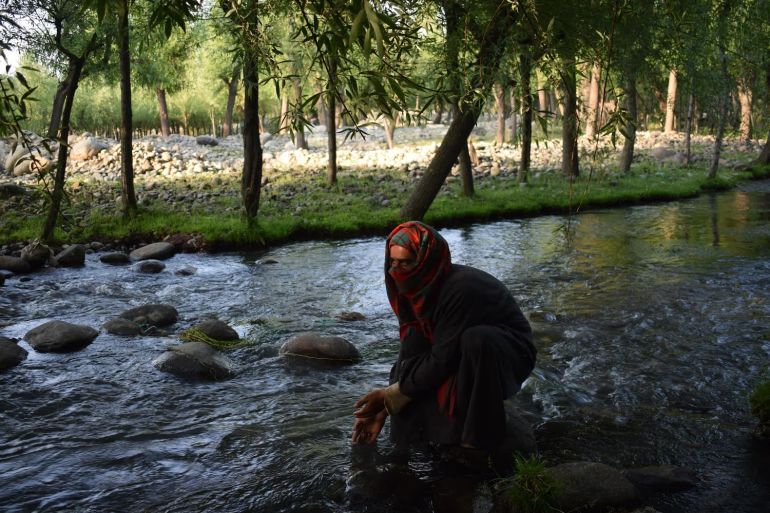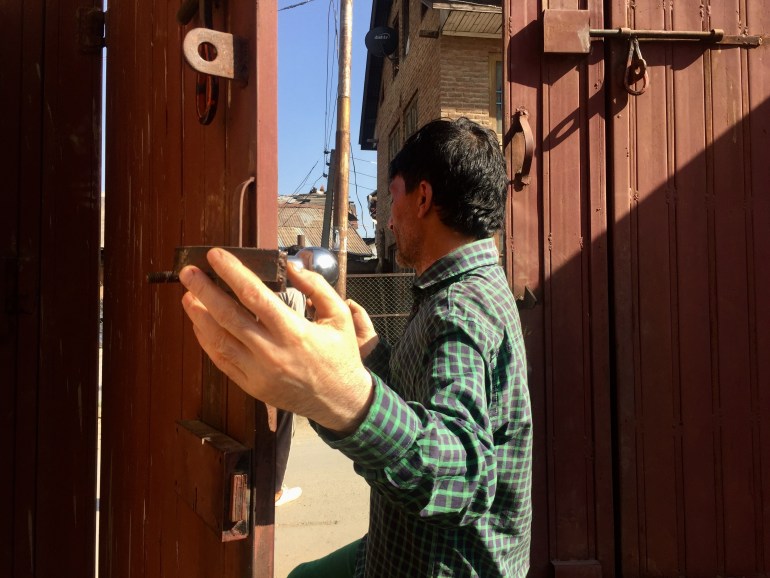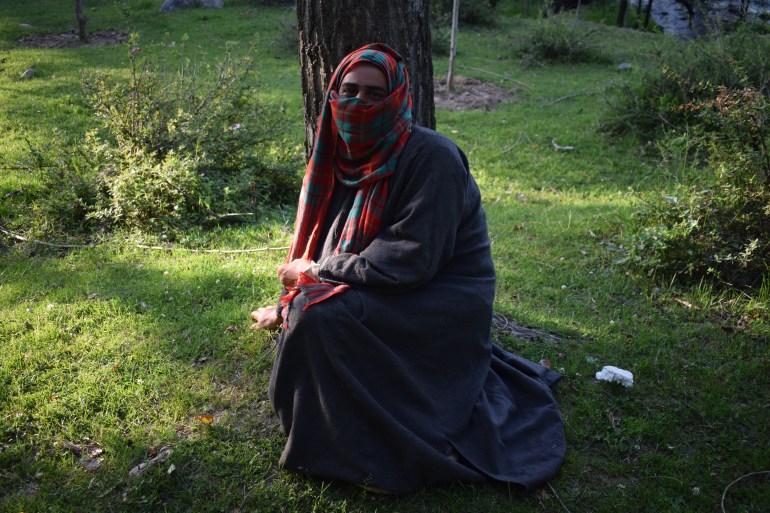‘My family tried to burn me’: LGBTQ Kashmiris suffer during COVID
Abuse and discrimination as the community faces a double whammy of a conservative society and continuous lockdowns.

Srinagar, Indian-administered Kashmir – For 36-year-old Sweety, being a transgender woman “is a curse”.
Hailing from a remote village in Indian-administered Kashmir’s Budgam district, Sweety was in her early 20s when she realised she is transgender.
Keep reading
list of 4 itemsVatican denounces gender-affirming surgery, gender theory and surrogacy
Fears of discrimination in Thailand despite looming same sex marriage bill
Uganda’s Constitutional Court rejects petition against anti-gay law
Back then, espousing a transwoman’s life was not an easy decision in a conservative place. But being the youngest child of her parents and “the most loved one”, her gender did not invite much trouble initially.
However, her luck did not last long. In 2016, Sweety lost both her parents within a span of four months.

With the coronavirus pandemic forcing people indoors, the social meetings of the LGBTQ community have also stopped. But home is not a safe place for the marginalised community.
‘Asked to leave the house’
In a desperate bid one day in March this year, Sweety took the risk of meeting her friend in the neighbourhood.
“When I reached home after the meeting, my brother slapped me. He choked me, I felt breathless. He tied my legs and then started hitting on my feet with a stick,” she said.
“Even the children in the house started crying. He stopped only when my sister-in-law intervened. My belongings were thrown out and I was asked to leave the house.”
Abandoned by her elder sibling, “presumably to maintain their social status”, as she put it, Sweety has now been living independently and managing the odds, facing all adversaries.
“For my family, my existence is a curse. They want me dead as soon as possible as they consider me a social liability,” she told Al Jazeera as she prepared her meal in a dimly lit room.
Sweety said she was thrashed so severely that she could not walk properly for weeks.
With restrictions on movement and social gatherings in place, the region’s LGBTQ residents have been pushed to live with hostile family members who often subject them to all kinds of abuse.
Abuse worsened during series of lockdowns
The problem has been compounded by a long spell of lockdowns in Kashmir, starting in August 2019 when the region’s special status was scrapped by the Indian government.
The six-month-long security shutdown was quickly followed by the COVID-19 pandemic that erupted in March last year. This year, a vicious second wave of the virus saw another long lockdown in the restive region.
According to the 2011 census, there are more than 4,000 LGBTQ members in the region, though the number could be higher as many are believed to be reluctant about expressing their sexual orientation.
The community members say the lockdowns saw a spike in violence and persecution against them, with many stories of domestic abuse emerging from the region.
A prolonged conflict against the Indian rule has also overshadowed their plight, with many of them abandoned by their families and subjected to physical, verbal and sexual violence.
They say they frequently receive pornographic videos, unsolicited photos of sexual organs, text messages from strangers demanding sex and lewd phone calls. They are also threatened about making their identities and photographs public on social media.
‘My family tried to burn me’
Hibba, 28, from the main city of Srinagar, identifies herself as a butch lesbian. He said he was “subjected to the worst form of mental and physical torture” by his family, which “increased manifold during the lockdown”.
He said he was beaten ruthlessly and often locked in a room without food.
“My family tried to burn me. They placed hot spoons over my body,” he said.
“Sometimes I wish to end my life, I wish to bury my existence. Maybe the wounds would heal but the bruises on my soul and mind will never heal. I am already three parts dead and I wish this torture puts an end to my sufferings for good.”
Hibba said he attempted suicide multiple times but would “survive miraculously”.
Hibba said the situation was made worse by the inability to meet his partner during the lockdowns. “If I could meet her, I would not have faced all the abuse,” he said.
Aijaz Bund, the first and perhaps the only LGBTQ activist in Kashmir, said there has been an exponential rise in violence perpetrated against the community since the first lockdown in 2019.
“LGBTQ+ people in Kashmir have always faced violence, but in normal times at least they had a temporary escape from families. They used to go out for work etc,” he said.
“But for the last two years, they have been forced to live with the abuse almost 24×7.”
Bund’s non-profit organisation, Sonzal Welfare Trust, is dedicated to the welfare of the LGBTQ community in the Muslim-majority region. He says the number of distress calls increased since the lockdowns.
“We would normally receive two-three distress calls a month but currently the number of calls goes beyond 200,” he said.
Last year, the region’s administration announced a pension scheme under which each transgender person was entitled to receive 1,000 rupees ($14) every month.
But the policy is yet to be implemented on the ground, with many also questioning if the amount is enough to survive for a month.
NGOs that work for the community are scant while Kashmiri activists, fearing a social backlash, do not speak for their rights.

In such a situation, there are some LGTBQ people who have managed to earn the acceptance of their families. Muskaan is one of them.
For the 26-year-old transgender, things changed when apple crops, her family’s main source of income, were destroyed for three consecutive years by pests and hailstorms.
‘Everyone respects her now’
As the family went into penury and debt, Muskaan in 2017 decided to take control of the situation.
“When we were left with almost no food to eat, I plunged into matchmaking. I would also sing and dance at weddings for money,” she said.
“When I would return home with cash in my hand, violence perpetrated by my family stopped altogether. Soon, I started taking all the decisions in the family.”
From being forced to quit school after she faced bullying and abuse by other students, Muskaan had come a long way. She started travelling extensively across the region to look for potential brides and grooms for the families looking for a match.
“For a parent, every child is the same and we love them equally. Initially, I was apprehensive about the reaction of neighbours and relatives and I took her to faith healers,” Muskaan’s mother Hajira told Al Jazeera.
“But the way Muskaan has taken the role of the breadwinner for the family, everyone respects her now. Her gender was God’s will and being a mother, I cannot reject her.”
But Muskaan was again faced with a crisis in April this year when the region was put under another lockdown and weddings stopped. She was left with no work while all her savings were consumed.
“We were at the brink of starvation. Weddings were postponed and I had to look for another source of livelihood,” she told Al Jazeera.
She now works as a mineworker who manually extracts sand, boulders and other minerals from the bed of the river Veshow next to her Yaroo village in Kulgam, some 80km (50 miles) away from Srinagar.
“This is a very tough work. My body is not made for this. I have to work 10 hours a day under the scorching heat to make around 1,400 rupees [$19],” she said, adding that the job was the only way to ensure that her family would not abuse her.
New Delhi-based sociologist Adfar Shah told Al Jazeera that being an LGBTQ person in Kashmir “is hell”.
“We are blindly discriminating against these people and labelling them as sexual deviants, evil and unwanted entities,” he said.
Islamic scholar Maulana Bilal Ahmad Qasmi told Al Jazeera Islam does not discriminate on the basis of gender.
“In Islam, trans-people have the same rights as other genders but it is unfortunate that these people have to face abuse of all kinds at the hands of family and society in general,” he said.